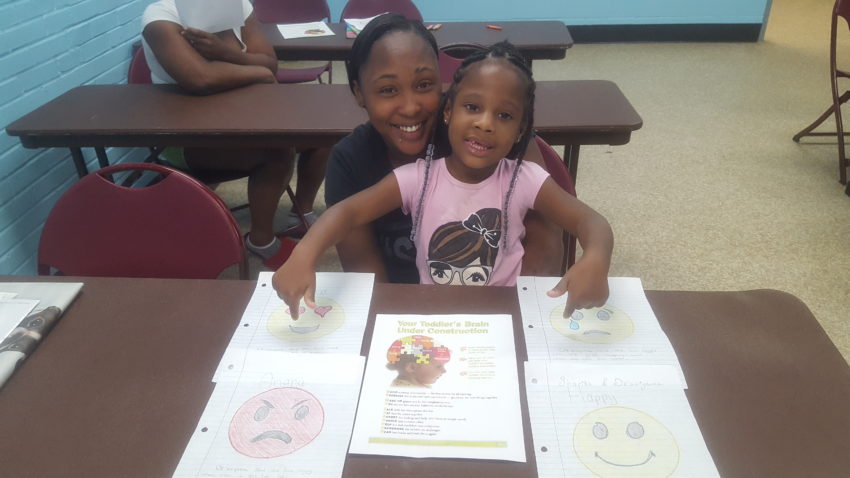SCI parent outreach program helps develop tools and skills for life
- October 30, 2017
- / Reggie Dogan
- / education

When communicating with our children, it’s not always what we say that gets the most important message across.
Non-verbal communication and the emotion it conveys account for more than 90 percent of what your child “hears” you say.
Children take many of their cues from the signals that you send them through your body language or the look in your eye.
In fact, research shows that when communicating a message, the tone of voice is 20 times more important than the actual words of the message. And that’s an important message for all of us to remember — whether we’re parents of tweens, teens, newborns or toddlers.
And that’s the message we delivered recently in a Studer Community Institute Parent Outreach Program session.
Part of the discussion included sharing with the parents that positive non-verbal communication can improve their relationships with their children and boost emotional connections in their families.
To be sure, parents are the most powerful influence on their children and deliver the most significant amount of non-verbal communication the children will receive in their lifetime.
Since July, SCI staff has offered parents tips, strategies and lessons on early learning initiatives to use with their young children under 4 years old.
The primary purpose is to provide parents with the skills to help build their babies’ brains and prepare them for kindergarten.
Each Wednesday at Moreno Court, mothers, fathers and even some grandparents attend the sessions that involve activities, videos, handouts, role-playing and table exercises centered on enhancing parenting skills.
On Thursdays, another set of parents from Attucks Court meet at the Fricker Resource Center for similar classes to enhance brain development in babies and toddlers and improve educational outcomes for the older kids in the families.
Our primary objective is to offer parents support and positive reinforcement as they strive to become their child’s first and most important teacher.
Building parent involvement is the single most important thing that parent groups do. Often, it’s the most difficult, too. And that’s too bad because there are many compelling reasons why parents—all parents—should get involved in their children’s education.
We assigned homework to parents after the lesson on non-verbal communication. The purpose was to get parents engaged in their children’s activities at home as well as to use the skills they learned in the home environment.
The homework required parents to record the emotions of their children to gauge how they felt when facing non-verbal communication scenarios.
Parent Sharika Abrams drew wonderful smiley faces to show how her little girl expressed emotions of happiness, sadness, anger and love.
On a sheet of page labeled happy with a yellow smiley face and big dark eyes, Sharika wrote: “De’aviyanna said she gets happy when she go visit her dad and gets happy when her godmother comes to pick her up.”
The assignment gave her an opportunity to put in practice a lesson learned in class and to use at home a strategy to bond with her child and share a learning experience.
That’s important because on average children from underserved communities know fewer words and have been read to less often than those in middle-income neighborhoods. Some parents never finished school, others have several jobs and no time to talk to their children or read to them at least 15 minutes every day. This affects the brain development necessary to prepare for success later in life, without which even early education is too late.
Parenting is difficult even in the best of circumstances, and when coupled with other stressful life situations, it becomes even more challenging.
We know that parent involvement in early literacy is directly connected to academic achievement.
Research shows that kindergarten readiness is among the most important measures of a child’s academic progress. Children who are behind in kindergarten are more likely to be behind in third-grade reading, and they rarely catch up throughout their school careers.
Children need parents to be their reading role models with daily practice in order to navigate successfully through beginning literacy skills.
Most parents want to be involved and engaged in their child’s learning, and many are able to establish and maintain ongoing and productive interaction with their children on a regular basis.
Some families, however, must deal with challenging circumstances, such as financial difficulties, separation and divorce, health issues, and language and cultural differences that complicate their ability to help their child succeed in school.
During these times, support and assistance from others are critical. That’s why the Studer Community Institute is working to offer parents support to help develop the tools and skills to improve their children’s lives and get them ready for school and life.
 CivicCon launches with a look at good growth in cities
CivicCon launches with a look at good growth in cities
 Building stronger brains one baby, one parent at a time
Building stronger brains one baby, one parent at a time
 SCI debuts commercial on Early Learning City
SCI debuts commercial on Early Learning City
 Entrecon: World class speakers and an opportunity to sharpen skills
Entrecon: World class speakers and an opportunity to sharpen skills
 PYP Quality of Life survey 2017
PYP Quality of Life survey 2017
 EntreCon Pensacola 2016: A look back
EntreCon Pensacola 2016: A look back
 Leadership tip: getting better employee takeaways
Leadership tip: getting better employee takeaways
 Leadership tip: be interested instead of interesting
Leadership tip: be interested instead of interesting
 Leadership tip: delivering difficult messages
Leadership tip: delivering difficult messages
 Brain Bags boost Arc, Early Childhood Court programs
Brain Bags boost Arc, Early Childhood Court programs